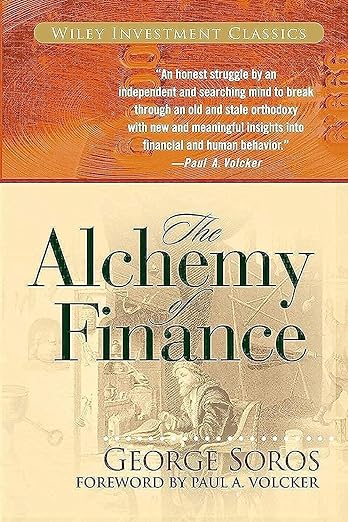Overview : The Alchemy of Finance Book
-
Book Title: The Alchemy of Finance
-
Author: George Soros
-
Publication Date: March 1987
-
Rating: 4.5
-
price: $15.99
-
Pages: 416
About the Author
George Soros, a legendary investor and philanthropist, offers unique insights in The Alchemy of Finance, blending his groundbreaking theory of reflexivity with real-world financial strategies. This work is an essential read for understanding Soros’s investment philosophy and market dynamics.
Introduction to The Alchemy of Finance Book By George Soros
In the ever-evolving world of finance and investing, few books have left as lasting an impact as George Soros's "The Alchemy of Finance." This seminal work, penned by one of the most successful and influential investors of our time, offers readers a unique blend of economic theory, practical investment strategies, and personal insights that continue to resonate in today's complex financial landscape.
Soros introduces the concept of reflexivity, a theory that challenges the traditional view of market equilibrium. By demonstrating how market participants' biases and actions influence market outcomes, Soros provides a framework for anticipating and navigating market cycles. Given the increasing complexity and interconnectedness of global financial systems, "The Alchemy of Finance" remains highly relevant to today's finance professionals, offering valuable lessons for both seasoned investors and those new to the field.
The Alchemy of Finance Book Summary and Key Themes
At its core, "The Alchemy of Finance" introduces Soros's groundbreaking theory of reflexivity, which challenges traditional economic assumptions about market efficiency and rationality. This concept suggests that market participants' perceptions can significantly influence market realities, creating feedback loops that drive prices away from equilibrium.
Key themes explored in the book include:
- The theory of reflexivity and its application in financial markets
- Soros's personal experiences in the hedge fund industry
- Analysis of historical market events and trends
- The interplay between economics and politics
- Critique of laissez-faire capitalism and advocacy for regulatory reforms
Analysis of Soros's Investment Philosophy
Soros's investment philosophy, as outlined in "The Alchemy of Finance," is rooted in his theory of reflexivity. He argues that market trends are often driven by self-reinforcing cycles of investor perception and market reality. This perspective challenges the Efficient Market Hypothesis, a cornerstone of modern financial theory.
One of the most compelling aspects of the book is Soros's detailed account of his famous trade against the British pound in 1992. This case study serves as a practical demonstration of reflexivity in action and highlights the potential for significant profits when one can accurately anticipate and capitalize on market trends driven by shifts in perception.
"Markets are constantly in a state of uncertainty and flux, and money is made by discounting the obvious and betting on the unexpected." - George Soros
Writing Style and Accessibility
Soros's writing style is characterized by its depth and complexity. While this may pose a challenge for some readers, particularly those without a strong background in finance or economics, it also lends credibility to his arguments. The book alternates between theoretical exposition and practical application, making complex concepts more accessible through real-world examples.
To aid comprehension, Soros includes charts, graphs, and detailed analyses throughout the book. These visual aids help illustrate key points and enhance the reader's understanding of complex market dynamics.
The Alchemy of Finance Book Strengths and Weaknesses
Strengths:
- Offers a unique perspective on market behavior from a highly successful investor
- Introduces the revolutionary concept of reflexivity in financial markets
- Provides valuable insights into the decision-making processes behind major trades
- Balances theoretical concepts with practical applications
- Addresses broader economic and political issues beyond individual investing
Weaknesses:
- Dense prose and complex arguments may be challenging for some readers
- Some concepts and examples may feel dated to contemporary readers
- The book's focus on macro-level investing may not be directly applicable to individual retail investors
The Alchemy of Finance Related Book
When compared to other influential books in the field of finance and investing, "The Alchemy of Finance" stands out for its philosophical depth and macro-level analysis. While books like Benjamin Graham's "The Intelligent Investor" focus on fundamental analysis and value investing, and Nassim Nicholas Taleb's "The Black Swan" explores the impact of rare events, Soros's work provides a unique framework for understanding the reflexive nature of financial markets.
In terms of its approach to market psychology, "The Alchemy of Finance" can be seen as a precursor to more recent works like Robert Shiller's "Irrational Exuberance," which explores the role of human behavior in driving market bubbles.
Relevance in Today's Financial Landscape
Despite being first published in 1987, many of the insights in "The Alchemy of Finance" remain highly relevant in today's financial world. The concept of reflexivity has gained increased recognition, particularly in light of recent market events such as the 2008 financial crisis and the rise of cryptocurrencies.
Soros's emphasis on the interconnectedness of global markets and the influence of political factors on economic outcomes is particularly pertinent in our current era of geopolitical uncertainty and rapid technological change. His critique of unfettered capitalism and call for more robust financial regulation continue to resonate in ongoing debates about market stability and economic policy.
Highlights from The Alchemy of Finance by George Soros
Theory of Reflexivity: Markets are not perfectly efficient; investor perceptions shape and influence financial outcomes, creating feedback loops.
Market Fallibility: Soros emphasizes that markets are inherently flawed due to human biases and irrational behavior.
Boom-Bust Cycles: Economic cycles are driven by reflexive feedback, where optimism inflates prices, leading to eventual market corrections.
Speculative Strategies: Successful investing requires anticipating how perception changes impact markets, rather than relying on traditional valuation.
Risk Management: Acknowledges the importance of adapting to market volatility and managing risk to succeed in financial speculation.
Continuous Learning: Stresses that adapting to new market realities is crucial for sustained success.
Conclusion and Recommendation
"The Alchemy of Finance" is a thought-provoking and insightful work that offers valuable lessons for investors, economists, and anyone interested in understanding the complex dynamics of financial markets. While it may require dedication to fully grasp its concepts, the rewards are substantial in terms of gaining a deeper understanding of market behavior and developing a more nuanced approach to investing.
For those looking to expand their financial knowledge and gain insights from one of the most successful investors of our time, "The Alchemy of Finance" is an essential read. Its enduring relevance and profound insights make it a valuable addition to any finance professional's or enthusiast's library.
Ready to dive into the world of reflexivity and gain insights from a legendary investor?
Click here to purchase "The Alchemy of Finance" on Amazon and start your journey towards a deeper understanding of financial markets today! In conclusion, this article has provided an overview of the topic at hand.





